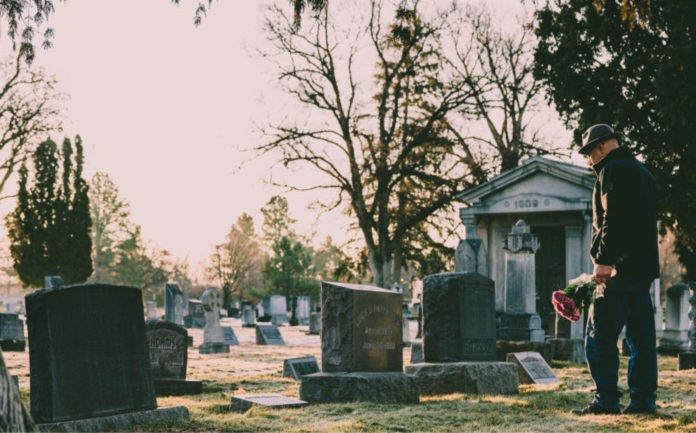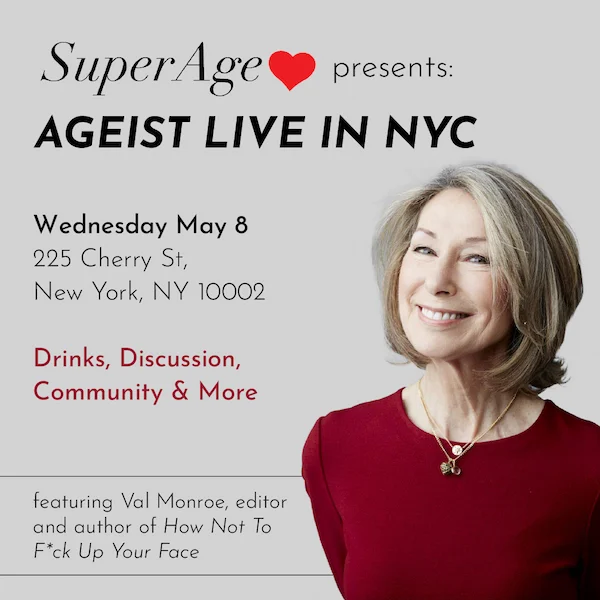A long life will give abundant challenges, rewards, and practice at aging. For those of us who toast Italian-style, “Cent Anni” — “May You Live 100 Years” — with real hopes to make it, there is also the unspoken prospect of outliving close friends, immediate family, your spouse, even children, if you do. We don’t talk openly about long lives in this regard, but losing loved ones along the way is a natural consequence. In this respect, being the oldest living member of a family, or in your group of friends, means you faced the repeated experiences of others dying, repeated grief, emotional turmoil, and bereavement. Practice with this aspect of life does not make it easier.
Death Cafe
Pro-age platforms that inspire us with reality-based aging, stellar examples of super agers and their unstoppable vitality, ingenuity and creativity, is long overdue and dynamically changing outdated stereotypes. But talking about dying is still taboo. Dying is never easy to discuss, even for the professionals. I recently stumbled on an outreach group, Death Cafe, where people get together over coffee, tea, eat cake, and discuss the finality of life, death and dying and why we fear it. The idea originated with the Swiss sociologist and anthropologist Dr. Bernard Crettaz, who organized the first café mortel in 2004. Jon Underwood, a UK web developer, was inspired by Crettaz’s work and developed the Death Cafe model in 2011. He was instrumental in the spread of the idea. Jon is now deceased, (at 44) and the cafe lives on with other organizers around the world and growing.

Together with grassroots efforts like these, the pro-age movement can tackle yet another aging taboo. Earnest approaches are indeed welcomed to guide and support those of us that are living longer lives to share our thoughts, wisdoms, even anxieties about dying and dealing with the death of others we love. Talking about dying goes beyond grief and bereavement; when we speak of death, suddenly we are dealing with our own existential thoughts thereby giving us the opportunity to create our own aging prophecy.
How can we best manage the stress and heartache that comes when our loved ones, family members, and best friends are facing the end of life and the dying process? How do we remain authentic in the day, the hour and the moment for those we love, experience grief, accept loss, and live and move on, over and over as we are reminded of the uncertainty of our own life?
How I Talk to People About Dying
Being in the medical profession, both as a hospitalist and palliative medicine/ hospice doctor, gave me many opportunities over the past 25 years to learn what worked best as the clinical caregiver for my patients, their families (and my own) when it was time to discuss grim circumstances. I encouraged optimism for every day. As a guide towards the end of life, I remind patients: I know no secrets about the unknown. We learned together how to be at ease, speak openly. The purpose of speaking honestly is to put words to the mystery, open up to our fears, address the emotional pain, release our emotional suppression we create when we act strong for those we love to hide and bury our devastation that goes beyond words. All of us at one point get perplexed, frustrated, and need and want to find meaning with our concerns, yet often feel powerless. Most importantly, I came to understand as a witness to the process of dying of those I love, and my patients, we share our mutual vulnerability.
Life Concepts
Faced with our own existential reality and struggles with heartache and loss, I found a few suggestions that do help others restore calm and are steps to help us manifest clarity, healing, and bring transformation towards remaining our whole self.
- Live life in the moment. Practical Wisdom: If life seems overwhelming with too many questions about the future or fears of the past, stick to the here and the now. Task: Master breath work and mindfulness, being in the moment when ‘now’ is all you can or want to manage.
- Don’t take anything joyful for granted. Practical Wisdom: To capture a moment of joy is in recognizing how precious the joyful moments of life are. Remember them with gratitude. Task: Practice the art of gratitude. Count your blessings.
- Plant seeds of love, spread happiness. Practical Wisdom: One constant regret of hospice patients is that they did not share their love ‘enough.’ Many claimed the secret to the best life was giving unconditional love. Task: People who spread the love, happiness, feel confident in their ability to cope. As a result, they can reach past fear to love and understanding. Give love freely without the need to be recognized for your effort, and express random acts of kindness.
- Meditate on your fears. Practical Wisdom: We should openly challenge our fears about dying. By expressing fears out loud, we start to overcome our beliefs that create fear. Fear arises with the threat of harm, either physical, emotional, or psychological, real or imagined. Nothing is more frightening than our demise, in loneliness and suffering. Task: Accept the humanity of our collective fears about death and dying; ask yourself, when fear arises, for spiritual relief in ways that have helped you in the past; or develop new coping skills for fear. If you need a professional coach, investigate who might best serve you. Create a support group of friends and family. If you don’t have a support group, (many persons lose their support as they age), make this point known to your caregivers.
Zoë A Lewis MD, lives in Miami Beach, Florida, and works as a traveling medical doctor, lifestyle and fitness model.
zoeannlewis@gmail.com
https://www.instagram.com/zoeannlewis/
https://www.linkedin.com/in/zoeannlewismd/




I think the thing that scares me the most about death was watching people laying alone in a hospital bed dying of COVID with no loved one or friend able to be next to them at the end. Oh I felt so sad for those people and still do. That would be my worst fear. I told my son to please not let me die alone. I held my mother’s hand as she passed and I pray she knew I was there.
Dear Gaila, What empathy you shared! The most anxious thoughts for most seem to be around isolation and pain, but the Covid pandemic raised the bar on the isolation aspect. I agree with you, having seen in hospitals where I worked, what you saw too first hand, with the covid isolation protocols put in place. . A collective humanity made tremendous sacrifices, and the greatest, those persons who had to suffer this loneliness to keep others safe in their dying moments. Despite trying our best in hospitals – even those on hospice with other reasons for dying, like cancer etc., did not have the benefits of a loving family or even the hospice workers, to help ease them, even if they were without Covid due to isolation protocols. It was a tragic consequence to this pandemic. We don’t control how, when or where we will pass, except in circumstances where the illness is prolonged allowing better planning, but we can hope that as we make our fears and wishes known, our loved ones will be present, to the best of abilities. Thank you for sharing.